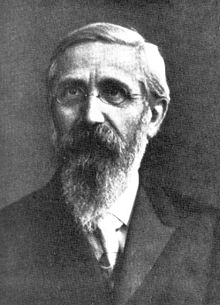| This article includes a list of general references, but it lacks sufficient corresponding inline citations. Please help to improve this article by introducing more precise citations. (May 2024) (Learn how and when to remove this message) |
| Paul Natorp | |
|---|---|
 | |
| Born | 24 January 1854 Düsseldorf, Rhine Province, Kingdom of Prussia, German Confederation |
| Died | 17 August 1924 (aged 70) Marburg, Province of Hesse-Nassau, Free State of Prussia, Germany |
| Nationality | German |
| Education | University of Strasbourg |
| Era | 19th-century philosophy |
| Region | Western philosophy |
| School | Neo-Kantianism (Marburg school) |
| Institutions | Marburg University |
| Thesis | Descartes' Erkenntnistheorie: Eine Studie zur Vorgeschichte des Kriticismus (Descartes's Theory of Knowledge: A Study in the Pre-history of Criticism) (1882) |
| Doctoral advisor | Ernst Laas (PhD advisor) Hermann Cohen (Dr. phil. hab. advisor) |
| Doctoral students | Hans-Georg Gadamer |
| Other notable students | Nicolai Hartmann, Martin Heidegger, Ernst Cassirer, Karl Barth |
| Main interests | Philosophical logic |
Paul Gerhard Natorp (24 January 1854 – 17 August 1924) was a German philosopher and educationalist, considered one of the co-founders of the Marburg school of neo-Kantianism. He was known as an authority on Plato.
Biography
Paul Natorp was born in Düsseldorf, the son of the Protestant minister Adelbert Natorp and his wife Emilie Keller. From 1871 he studied music, history, classical philology and philosophy in Berlin, Bonn and Strasbourg. He completed his doctoral dissertation in 1876 at the University of Strasbourg under the supervision of the philosopher Ernst Laas and in 1881 completed his Habilitation under the neo-Kantian Hermann Cohen. In 1885 he became an extraordinary professor and in 1893 became an ordinary professor in philosophy and pedagogy at Marburg University, a position he retained until his retirement in 1922. In the winter semester of 1923–24 Natorp conducted an intensive exchange of ideas with Martin Heidegger, who had been called to Marburg and whose work on Duns Scotus Natorp had read very early on.
In 1887 he married his cousin Helene Natorp; they had five children. Natorp was an ambitious composer, who wrote chiefly chamber music (including a cello sonata, a violin sonata, and a piano trio). He also wrote some 100 songs and two choral works. He conducted a correspondence with Johannes Brahms, who dissuaded him from becoming a professional composer.
He was an influence on the early work of Hans-Georg Gadamer and had a profound effect on the thought of Edmund Husserl, the "father" of phenomenology. His students included the philosopher and historian Ernst Cassirer, the theologian Karl Barth and the author of Doctor Zhivago, Boris Pasternak.
Works
- Descartes' Erkenntnistheorie. Eine Studie zur Vorgeschichte des Kriticismus. 1882; 2014, ISBN 978-3-944253-04-6
- Sozialpädagogik (1899)
- Logik in Leitsätzen (1904)
- Gesammelte Abhandlungen zur Sozialpädagogik (3 volumes, 1907)
- Pestalozzi. Leben und Lehre (1909)
- Die logischen Grundlagen der exakten Wissenschaften (1910)
- Philosophie; ihr Problem und ihre Probleme (1911), new edition: Edition Ruprecht, Göttingen 2008 (ed. and introduction by Karl-Heinz Lembeck), ISBN 978-3-7675-3055-3
- Sozialidealismus (1920)
- Beethoven und wir (1920)
- Platos Ideenlehre (1921); transl. 2004, Platos's Theory of Ideas: An Introduction to Idealism., Academia Verlag ISBN 978-3-89665250-8
- Allgemeine Logik (in: Flach und Holzhey, Erkenntnistheorie und Logik im Neukantianismus, 1979)
Notes
References
- Judy Deane Saltzmann Paul Natorp's Philosophy of Religion within the Marburg Neo-Kantian Tradition (1980)
- Alexis Philonenko L'École de Marbourg : Cohen, Natorp, Cassirer (1989)
- Karl-Heinz Lembeck Platon in Marburg: Platon-Rezeption Und Philosophiegeschichtsphilosophie Bei Cohen Und Natorp (1994)
- Julien Servois Paul Natorp et la Théorie Platonicienne des Idées (2004)
- Norbert Jegelka Paul Natorp (1992)
External links
Categories:- 1854 births
- 1924 deaths
- 19th-century German composers
- 19th-century German historians
- 19th-century German male writers
- 19th-century German philosophers
- 20th-century German composers
- 20th-century German historians
- 20th-century German male writers
- 20th-century German philosophers
- Continental philosophers
- Descartes scholars
- German logicians
- German historians of philosophy
- Kantian philosophers
- German philosophy academics
- Academic staff of the University of Marburg
- University of Strasbourg alumni
- Writers from Düsseldorf